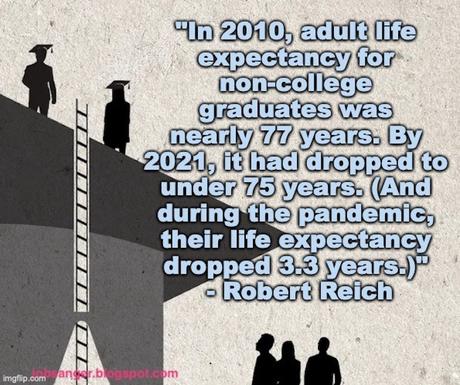
The following is part of a thought-provoking post is by Robert Reich:
I want to examine a root that hasn’t gotten nearly the attention it deserves: the remarkable reversal in life expectancy among those without college degrees, many of whom comprise Trump’s base.
In 1900, U.S. life expectancy was 47 years. Infectious diseases routinely claimed babies. Women died in childbirth or from complications arising from childbirth. Many diseases were incurable.
Then came antibiotics, insulin, vaccines, the surgeon general’s report on smoking and cancer — followed by a sharp drop in smoking, the introduction of CT scans and MRIs, and steady improvements in sanitation and water supplies. Poverty and sickness in the elderly were eased by Social Security and Medicare.
Life expectancy in America soared. By 2010, it was approaching 80 years.
But then something happened — and it happened even before COVID. Life expectancy for most Americans reversed course.
Why?
Research by economists Anne Case and Angus Deaton shows that life expectancy did not reverse course for the 30 percent of Americans with four-year college degrees.
It reversed for people without college degrees.
Life expectancy for those with four-year college degrees was 84 years on the eve of the pandemic — up from 79 years in 1992. During the pandemic, their life expectancy slipped a year.
But for those without college degrees, life expectancy has been falling since 2010.
In 2010, adult life expectancy for non-college graduates was nearly 77 years. By 2021, it had dropped to under 75 years. (And during the pandemic, their life expectancy dropped 3.3 years.)
Why does this widening gap in life expectancy correlate with whether someone has a four-year college education?
Because Americans with college degrees have become far wealthier, on average, while those without college degrees have become poorer and less economically secure.
In 1990, America’s total wealth was equally split between those with and without college degrees. Today, three-quarters of wealth is owned by college graduates.
Meanwhile, the wages of people without college degrees have stagnated or declined. Average weekly nonsupervisory wages — a measure of blue-collar, non-college earnings — were higher in 1969 (adjusted for inflation) than they are now.
Most Americans without college degrees are now working harder and longer hours than they worked decades ago and taking fewer sick days or vacations. They also have less economic security. Nearly one out of every five American workers is in a part-time job. Two-thirds are living paycheck to paycheck.
Income and wealth have direct impacts on health and longevity. They determine access to life-supporting services like high-quality preventive health care, nutritious food, and housing.
And they have a lot to do with whether someone is subject to life-threatening things like handguns, opioids, and economic stress.
Other developed countries — Japan, Canada, most European countries — have not experienced declining life expectancies among non-college graduates or a widening gap in lifespans between those with four-year college degrees and those without them.
Why this discrepancy among developed nations?
Because other developed nations have stronger and more generous social safety nets. They finance their much less costly health care through government support rather than through what is essentially a flat tax on employment (employer payments for health insurance are effectively taken out of a worker’s salary).
And because a far higher percentage of non-college workers in other developed nations are organized into unions that have successfully pushed for higher wages and have enough political clout to resist efforts to erode the safety nets they count on.
Social and economic trends in the United States have fostered an increasingly angry and frustrated working class, highly susceptible to the resentments and grievances of Trumpism.
Americans who for decades have been on a downward economic escalator have become easy prey for demagogues peddling the politics of hate.

